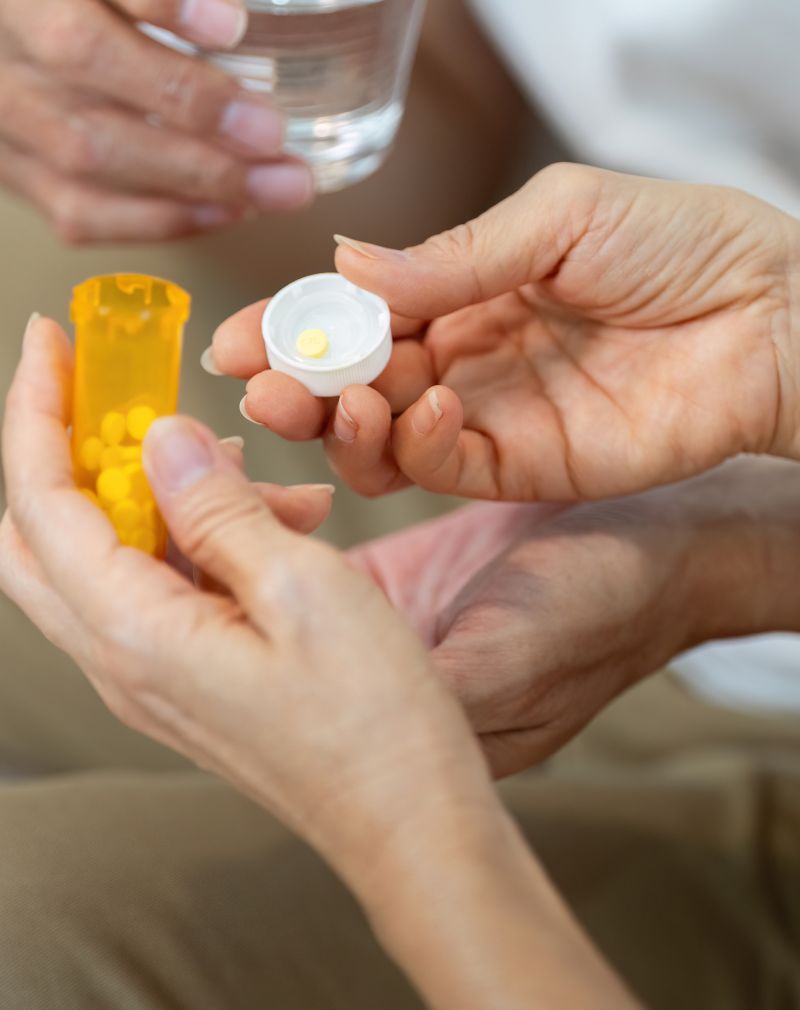Over 60% of people with mental health conditions either delay medication or avoid it entirely. Not because they don’t want help but because they’re scared of what that help might mean.
They’ve been told it will change who they are. Make them numb. Make them dependent. Most of those stories come from fear, not fact.
And here’s the brutal truth: some people would rather suffer quietly than be judged for taking a pill.
That hesitation is real. So is the confusion that surrounds psychiatric medication. What it does. What it doesn’t. Who it’s for. And when it’s the right time.
At The American Wellness Center in Dubai Healthcare City, our Psychiatry Department hear these questions every day. This blog is here to answer them with honesty, care, and zero pressure.
The Myth vs. Reality of Psychiatric Medication
People have strong feelings about psychiatric medication. Most of them come from fear, not facts.
Let’s clear the air.
The idea that antidepressants change your personality is one of the most common myths we hear. They don’t. What they actually do is help you return to your baseline; the version of you that isn’t constantly fighting sadness, anxiety, or exhaustion.
And no, psychiatric medication isn’t addictive. The majority, such as SSRIs used for depression and anxiety, don’t cause physical dependency. Certain medications, like benzodiazepines for severe anxiety, can create dependency if misused but that’s why they’re prescribed carefully and monitored closely.
The hardest myth to break is the one that says “If I take meds, I must be weak.”
That’s not weakness. That’s biology. Mental health conditions change how your brain’s chemistry functions. Medication helps correct that, just as insulin helps a diabetic control blood sugar.
- Taking medication isn’t about losing control. It’s about getting it back.
- Healing doesn’t mean pretending you can do it all alone.
- Getting better is strength, not surrender.
More than 70% of people with moderate to severe depression show real improvement within two months of starting treatment, especially when combined with therapy. That’s not luck. That’s medicine doing what it’s supposed to do.
Understanding How Psychiatric Medications Work
Your brain runs on chemistry; tiny messengers called neurotransmitters. When those messengers get out of balance, mood and focus change too.
Antidepressants and anxiety medications work by restoring that balance. SSRIs and SNRIs, for example, help your brain hold onto more serotonin or norepinephrine, which improves mood and energy. Mood stabilizers and antipsychotics fine-tune other pathways, supporting clearer thinking and emotional steadiness.
It’s not instant. These medications build their effect slowly, often over four to six weeks. That’s not failure, it’s how your brain adjusts.
Medication isn’t meant to replace therapy or lifestyle care. It’s one part of a broader treatment plan, alongside counseling, sleep, exercise, and social connection.
- Medication is a bridge, not a finish line.
- It gives you enough balance to do the work that heals you.
Modern psychiatric medications now help reduce core symptoms of depression and anxiety by as much as 70% when paired with therapy. That’s a reminder that science and support work best together.
Side Effects: What’s Normal, What’s Not, and What to Do
Let’s be honest; side effects scare people more than the illness itself sometimes.
Here’s the truth: most are mild, short-lived, and manageable. The body needs time to adjust, just like when you start a new workout or change your sleep pattern.
You might feel mild nausea, sleep shifts, or headaches at first. These usually fade within a couple of weeks. What matters is staying in touch with your doctor so any uncomfortable reaction can be addressed early.
At The American Wellness Center in Dubai Healthcare City, psychiatrists track this process closely. We start with the lowest effective dose, adjust slowly, and check in often.
- Your comfort matters as much as your progress.
- If something feels off, it’s not “complaining”, it’s useful information.
- Good psychiatry listens before it prescribes again.
Current data shows that only about 5–7% of patients stop medication due to difficult side effects when monitored properly. That’s because most issues can be fixed with small changes, not big fears.
Who Needs Medication – And Who Might Not
Not everyone with stress or sadness needs medication. And that’s perfectly fine.
Medication becomes important when symptoms start taking over your life; when your mood, sleep, work, or relationships suffer despite your best efforts.
It’s often the right step for people with:
- Major depression that lingers or deepens over time
- Generalized anxiety that won’t calm down with therapy alone
- Bipolar disorder or schizophrenia, where chemical balance is essential
- PTSD or OCD when intrusive thoughts or flashbacks make daily life hard
Milder emotional strain like grief, burnout, or short-term stress often responds well to therapy, structure, and support without medication.
At The American Wellness Center in Dubai Healthcare City, we don’t jump straight to pills. We take time to understand your full story, your health, sleep, diet, and life load before recommending anything.
- The right treatment always fits the person, not just the diagnosis.
- You deserve a plan built with you, not for you.
In the UAE, one in three people with anxiety report symptoms serious enough to disrupt their daily life. Yet most never seek treatment. That silence costs more than any side effect ever will.
Stigma in the Middle East: Cultural Barriers to Seeking Help
Mental health still makes people whisper. Not because it’s rare, but because it’s personal.
Across the region, many still see anxiety, depression, or panic attacks as weakness. Something to hide. Something that “a strong person” should handle quietly.
That silence hurts more than the illness itself. It keeps people from seeking care until the damage runs deep.
At The American Wellness Center in Dubai Healthcare City, our Psychiatry Department meets people caught between belief and biology. They know something is wrong, but they also know what others might say if they reach for help.
- Fear of judgment keeps more people sick than the illness itself.
- Suffering in silence doesn’t build strength. It builds scars.
- The right treatment doesn’t challenge your values. It protects your life.
Nearly six in ten residents in the UAE say they would delay treatment because of fear of judgment from family or colleagues. That’s not just a statistic, a mirror of what still needs to change.
Our Psychiatry Department offers care that respects culture, faith, and family. You don’t have to choose between what you believe and getting better. You can hold both and heal fully.
The Role of Therapy in Medication Management
Medication calms the storm. Therapy teaches you how to steer through it.
The two aren’t rivals. They’re partners. Medication brings balance to the body’s chemistry. Therapy brings understanding to the mind that lives inside it.
Our psychiatrists and psychologists work side by side. When medication lifts the fog, therapy helps you see what’s been hiding underneath; the habits, the pain, the patterns that keep pulling you back.
This combined care isn’t guesswork. Studies show that pairing therapy with medication can cut relapse rates by more than half.
- Pills help you stand. Therapy helps you walk forward.
- Healing happens faster when science and conversation meet.
At The American Wellness Center, treatment doesn’t end with a prescription. It begins with a plan built around you, your pace, your life.
What to Expect from a Medication Consultation at AWC
The first appointment shouldn’t feel like an interrogation. It’s a conversation.
Our psychiatrists begin by listening. You’ll talk about how you’ve been feeling, what’s been changing in your sleep, focus, or mood, and how it’s affecting your daily life. They’ll ask about medical history, family background, and lifestyle because your mind doesn’t exist separate from your body.
From there, you’ll discuss options together. Sometimes that means starting medication. Sometimes it doesn’t. What matters is that the decision is shared, not handed down.
Follow-ups are part of the process. Adjustments happen gently, with your comfort in mind. Progress is tracked, questions are answered, and no one is rushed.
- The goal isn’t to medicate you. It’s to understand you.
- Healing is a dialogue, not a prescription.
- The first step is a talk, not a label.
At The American Wellness Center in Dubai Healthcare City, psychiatry isn’t about changing who you are. It’s about helping you return to the version of yourself you’ve been missing.
When You’re Finally Ready to Feel Like Yourself Again
Most people don’t ask for help when the pain begins. They wait. They tell themselves it’s just stress, just tiredness, just a phase. Until one day it isn’t.
By then, the world feels smaller. Sleep feels harder. Hope feels foreign.
You don’t have to wait for that day. You can start before it breaks you.
Medication isn’t about giving up. It’s about giving yourself a chance to breathe again, to think clearly, to remember what steady feels like.
At The American Wellness Center in Dubai Healthcare City, our psychiatry team walks beside you, not ahead of you. We listen first, plan together, and move at your pace.
If you’ve read this far, you already know something needs to change.
Let us take that next step with you.



